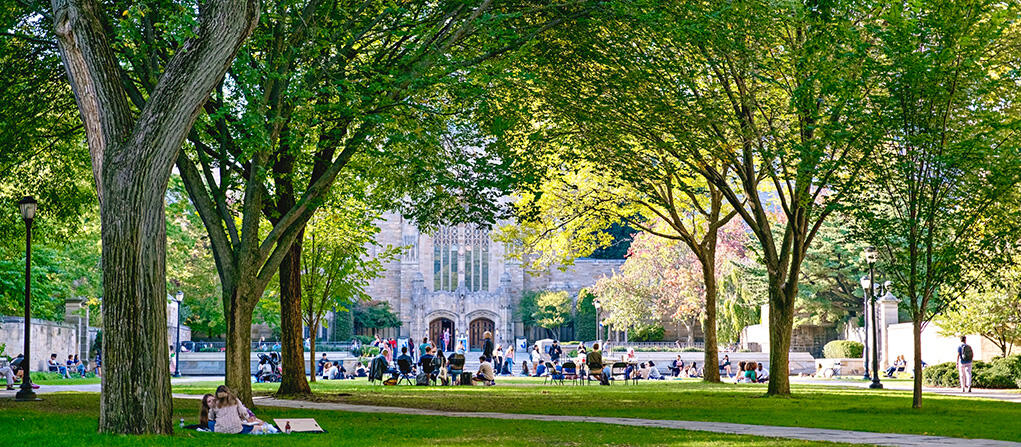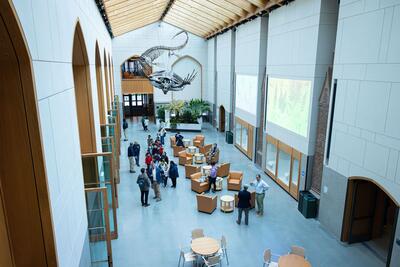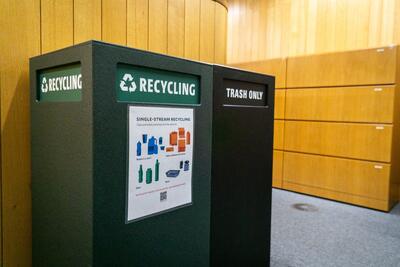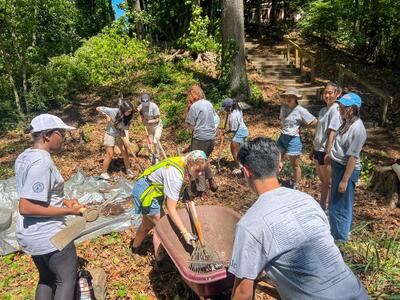
Yale University has released its 2024 progress report for the Yale Sustainability Plan 2025, highlighting significant advances made in the past year toward making the university more sustainable for those who study, live, and work here.
Launched in 2016, the strategic plan has served as a comprehensive roadmap for the university’s pursuit of environmental, social, and economic sustainability during a decade when the consequences of climate change have become starker.
As of 2024, Yale has achieved 23 of the goals outlined in the plan resulting in wide-ranging impacts—from how the university conserves energy to how food is sourced for dining halls, how goods and services are purchased, how materials are diverted from the waste stream, and how to promote the well-being of the campus community.
“Our progress showcases the incredible dedication and collaborative spirit within our community. Each step forward in our sustainability efforts is a collective achievement,” said Amber Garrard, Director of the Office of Sustainability. “We celebrate the advances made in 2024 and look ahead with optimism toward Yale’s continuing climate and sustainability goals.”
Key Sustainability Accomplishments in 2024
Yale’s sustainability efforts in 2024 reflect the university’s commitments to driving operational excellence while actively engaging with university and New Haven communities.
Highlights from the past year include:
Energy & Emissions
- The university maintained a 28% net decrease in its scope 1 and 2 greenhouse gas emissions from 2015 levels, despite campus growing by 14%. Net emissions represent the university’s total scope 1 and 2 emissions minus carbon offsets that are purchased and retired. Read more about Yale’s approach to climate action on campus.
- Yale continued and expanded its wide-scale building energy monitoring system. This comprehensive process enabled in-house staff to help identify efficiency and operational issues with building ventilation systems; make repairs in a timely manner; and save 18,000 MMBTU of energy.
- In 2017, Yale identified six categories of scope 3 emissions– emissions that occur because of Yale’s operations, but from sources not owned or controlled by the university – that are most relevant to the university. In 2024, we continued to refine pathways for mitigating our impact in these categories.
Capital Program
 Five LEED Gold buildings came online in 2024. In total, 17 Yale building projects have earned LEED Gold certification since 2016.
Five LEED Gold buildings came online in 2024. In total, 17 Yale building projects have earned LEED Gold certification since 2016.- The reopened Yale Peabody Museum earned LEED Gold following a four-year renovation. The museum features an improved building envelope, state-of-the-art air-handling units, systems to capture and utilize rainwater in the landscape, bird-safe glass, and expanded galleries and classroom spaces.
- The Living Village at Yale Divinity School, the university’s first Living Building project, is under construction and set to open in fall 2025. The project demonstrates the school’s commitment to housing future environmental leaders in a regenerative building that will give back to the environment more than it takes.
Mobility
 The Yale Shuttle achieved a 23% increase in ridership following the introduction of new shuttle routes and an improved real-time shuttle tracker.
The Yale Shuttle achieved a 23% increase in ridership following the introduction of new shuttle routes and an improved real-time shuttle tracker.- In 2019, Yale had five single-hose electric vehicle charging stations available for fleet vehicles and drivers parking on campus. Since then, 38 dual-hose units have been installed, for a total of 76 charging options. Thirteen of Yale’s fleet vehicles are now electric, including six EVs acquired in 2024. University policy requires that all new vehicle purchases be alternative fuel.
Waste Reduction
 To help improve campus waste diversion rates, the university redesigned and deployed new recycling and waste signs campuswide, updating 22,000 labels and 10,000 signs for food waste, single-stream recycling, and municipal solid waste. The redesign was supported by a university-wide campaign to raise visibility about best practices and common mistakes in waste-sorting.
To help improve campus waste diversion rates, the university redesigned and deployed new recycling and waste signs campuswide, updating 22,000 labels and 10,000 signs for food waste, single-stream recycling, and municipal solid waste. The redesign was supported by a university-wide campaign to raise visibility about best practices and common mistakes in waste-sorting.- Spring Salvage—which collects and donates unwanted items during undergraduate student move-out in May—recovered 2% more material compared to the prior year.
- Construction and demolition waste is a large waste steam for Yale and the university is committed to making an impact. Last year, Yale diverted 76% of its construction and demolition waste such as concrete, drywall, and bricks through recycling and reuse efforts.
Stewardship & Resilience
- In 2024, a Stormwater Planning Study for Central Campus and Yale School of Medicine was completed, identifying critical areas for greater stormwater management. Additionally, planning is underway for stormwater mitigation projects at West Campus, and revised stormwater standards for the university are in development.
- The university created a tree management plan for the Yale Golf Course and partnered with researchers and students to enhance biodiversity on the site and the surrounding nature preserve. A unique partnership between the Yale School of Environment, Yale Athletics, and Yale Facilities has enabled this project to serve as a living laboratory for hands-on research and enhanced operations.
New Haven Partnerships
 In summer 2024, Yale placed nine student fellows in local organizations through the Yale Office of New Haven Affairs to enhance community greenspace and lead environmental education initiatives.
In summer 2024, Yale placed nine student fellows in local organizations through the Yale Office of New Haven Affairs to enhance community greenspace and lead environmental education initiatives.- Through several Yale Planetary Solutions seed grants, the university advanced research projects that partner with New Haven community members and aim to develop scalable climate solutions to challenges such as urban air quality, environmental literacy, and more.
Looking to the Future
While celebrating the goals achieved, the university continues to pursue opportunities for improvement that will build on our progress and strengthen the culture of sustainability at Yale.
Campus waste diversion remains low at 34%—below the pre-pandemic norm, when 40% of materials on campus were diverted from the waste stream, and well below the current target of 60%. Operational leaders continue working towards actions aimed at improving the university’s waste diversion while new signage and communications efforts aim to increase awareness and shift behavior.
Likewise, the rapidly evolving use of data centers and AI has surfaced questions about how to reconcile the university’s energy use with programming demands—considerations that are being carefully weighed as Yale seeks to expand its technology use responsibly. In 2024, Yale became a member in the Massachusetts Green High Performance Computing Center consortium, shifting computationally intensive research from less efficient campus infrastructure to a LEED platinum-certified green data center.
“Many challenges remain ahead of us, and we will continue to work on setting goals and targets that keep us focused on the direction we need to be moving in, while aligning with our institutional mission and values,” said Garrard.
Yale’s sustainability work is being further advanced by Yale Planetary Solutions (YPS), a university-wide initiative spanning academics and operations—and synergies between the two. The mission of YPS is to advance planetary solutions through all that Yale is—from students and faculty to collections and campus buildings—and all that Yale does, from researching, to teaching, to operating, investing, convening and leading.
The Yale Planetary Solutions Steering Committee—composed of leaders from across the institution—described a framework for the university’s work in this critical space in a report released in June 2024. Throughout the coming year, Yale Planetary Solutions will lead a process to build the next evolution of the climate and sustainability vision for the university, developing goals in collaboration with schools and units across the campus, and structures to support institutional accountability that fuel our collective success.
“It’s inspiring to see how our community can unite to advance sustainability on multiple fronts,” Garrard added. “Our collective efforts have led to significant strides in environmental stewardship, social equity, and resource management. Moving forward, we are dedicated to building on these accomplishments, fostering a culture that integrates sustainability into every aspect of university life and prepares us to meet the challenges of the future.”
Read the full 2024 Yale Sustainability Progress Report.
Explore our new story map, “16 ways Yale advanced campus sustainability in 2024.”
Read the full Yale Planetary Solutions Steering Committee Report.